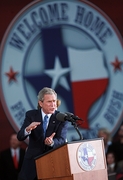 The Bush presidency can hardly be termed a success. But I suspect, historians will soon be boosting Bush’s standing. Why? Because Bush’s answer to the terrorism question is, basically, right. In the short term, you have to disrupt their networks, deny them safe haven and—if all else fails—kill them. But in the long term, you have to fight the causes of terrorism by creating democratic, prosperous societies where people control their own destinies: in such places, terrorists and their causes do not find support. But, ironically considering that Bush was the first MBA president, the execution of these ideas was appalling.
The Bush presidency can hardly be termed a success. But I suspect, historians will soon be boosting Bush’s standing. Why? Because Bush’s answer to the terrorism question is, basically, right. In the short term, you have to disrupt their networks, deny them safe haven and—if all else fails—kill them. But in the long term, you have to fight the causes of terrorism by creating democratic, prosperous societies where people control their own destinies: in such places, terrorists and their causes do not find support. But, ironically considering that Bush was the first MBA president, the execution of these ideas was appalling.
There’s also a paradox when it comes to Bush and presidential decision making. I suspect that Bush’s decision to order the surge will soon be regarded as one of the great acts of presidential leadership. His own Secretary of State, huge chunks of his own party, the foreign policy establishment, the media and public opinion wanted the United States to cut its losses and start withdrawing from Iraq. But Bush refused to accept this and instead listened to those few military officers and national security officials who could see that more troops and a new strategy could begin to change things round. As Tony Blair reportedly said in his farewell tribute to Bush, it was an act of immense political courage. But set against that there is Bush’s utter refusal until the summer of 2006 to see how badly the Donald Rumsfeld strategy was failing in Iraq.







Comments